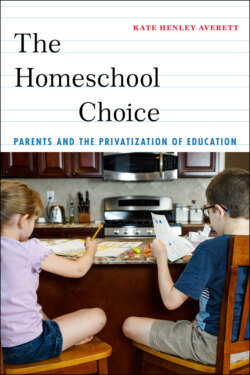Читать книгу The Homeschool Choice - Kate Henley Averett - Страница 20
На сайте Литреса книга снята с продажи.
Homeschooling Outcomes
ОглавлениеOne of the most frequent questions I get when I tell people that I research homeschooling is whether it “works”—in other words, is homeschooling an academically viable practice? While outcomes (academic or otherwise) are not the subject of my research, the question of outcomes is certainly a valid one. Homeschooling advocates are often quick to cite studies that show that homeschoolers have better academic outcomes than their peers, saying, for example, that homeschoolers tend to perform at least one grade level ahead of their peers in public and private schools, that they score higher than students in public schools on various standardized tests, and that they attend and graduate from college at higher-than-average rates.34
That said, many scholars argue—and rightfully so—that it is important to take the statistics on academic outcomes for homeschoolers with a grain of salt.35 Because homeschoolers are a diffuse population, it is hard to collect random samples of homeschoolers, so there is likely some degree of sampling bias influencing these statistics, wherein those who choose to take part in research are not statistically representative of the whole population.36 Additionally, the practice of homeschooling itself has a high degree of selection bias: those who opt in to the practice of homeschooling are not representative of all parents in a lot of ways.37 Perhaps most notably, homeschooling parents tend to be highly involved in their children’s education, and it is likely that they would have been highly involved even if their children were enrolled in public schools. Because parental involvement is a key predictor of academic success, it is highly likely that these youth would have better-than-average academic success no matter where—or how—they were educated, and most of the existing studies of homeschool outcomes do not contain the necessary data and/or control variables to account for this selection.
This does not mean that homeschooling is more or less the same as any other academic option. What it does mean, however, is that we cannot necessarily rely on measures of academic success, such as test scores, to determine whether homeschooling “works.” My research indicates that it could be helpful to approach this question by looking at differences in skills, such as critical thinking, time management, and self-motivation, between homeschoolers and those in traditional schools. Many parents I interviewed argued that homeschool students are better prepared for college courses than their peers in public schools because the methods of learning are more similar; homeschoolers are used to taking charge of their own learning, rather than relying on classroom instruction as the primary site where learning takes place. In other words, it may not be what they learn but how they learn that makes many homeschoolers successful, not just in college but in the workplace and beyond.
